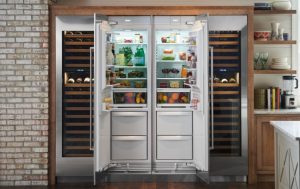Appliance Tips for Safely Cooking in Your Kitchen

Home appliances have an extensive safety track record, but only when they are used properly. There are rigorous safety tests for appliances before they ever make it to the shelves in your local retailer. This means that many appliance accidents are preventable and these tips can help you to stay safely cooking in your kitchen.
Be Aware of Hot Surfaces
It may sound obvious, but you need to avoid touching any hot surfaces. Manufacturers design areas of appliances, particularly portable appliances that can be safely handled to reduce the risk of injury. For examples, crock pots are designed with two handles to be carried safely. Other areas that tend to stay cooler are the control knobs, so if a knob or handle breaks ensure that you obtain a replacement from the manufacturer.
Unplug Your Small Appliances
There is a risk of electric shock from any appliance, whether it’s switched on or not. So, you should unplug all your small appliances when you’ve finished using them. This will not only drop the risk of an electric shock to almost zero, but it will also protect you and your home if the appliance develops a fault and starts to spark.
Don’t Allow Cords to Hang
Hanging cords can be a dangerous hazard around your home. Not only is a cord a trip hazard, but children can also be injured by snagging a cord and pulling an appliance down on themselves. This scenario can be made even worse if the appliance is hot or has boiling contents such as a kettle, deep fryer or crockpot. Some small appliance models feature breakaway connectors to reduce falling appliances should the cord be pulled, but the simplest method is to ensure that any excess cord is safely tucked away.
Don’t Cook Your Small Appliances
Portable appliances can be prone to damage or even melting if they are stored near your oven or range. The heat from your stove can not only cause damage to the outside of your appliance, but it could allow internal components to be exposed, creating a risk of malfunction, electric shock or even a fire hazard. In the same way, you should keep your small appliances away from your sink or wet surfaces.
Treat All blades as You Would a Knife
Food processors often have an interlocking feature that prevents the blades from rotating when you take the appliance apart for cleaning. Unfortunately, this doesn’t mean that you don’t need to take great care during cleaning. Remember that any blade is a sharp cutting tool and should be treated as you would any knife.
Use Proper Microwave Cooking Times
Whether you’re making a baked potato or cooking up some popcorn, there is a risk of a microwave fire. The most common cause of microwave fires is leaving food cooking for too long. Many models feature a sensor to shut off the microwave in case of fire, but prevention is much better than dealing with a mess. Don’t just guess the cooking time, as you may forget things are in the microwave. If you do have a microwave fire, switch off the device and keep the door closed.
Keep an Eye on What’s Cooking
Unattended cooking is a leading cause of house fires, so it is vital that you watch whatever you’re cooking. Whether you’re using the stovetop or roasting in a range, burned food or pots boiling over cannot only cause a mess, but could lead to a fire.
If you’re worried about your appliance safety and are thinking about upgrading, you can explore the options with this collection of home appliances. If you need a more specialist service, you should speak to a home appliance professional.
- How to Design a Year-Round Outdoor Kitchen in Southern California
- What Are Flush-Mount Appliances: Flush-Mount Appliances Explained
- What Appliance Brands Hold Their Value the Longest
- Designing the Ultimate Outdoor Bar: Must-Have Appliances for Year-Round Fun
- Luxury Refrigerator Guide 2025: Built-In vs. Freestanding and What to Know Before You Buy
- How Smart Appliances Are Changing Luxury Kitchen Design in 2025
- The Ultimate Outdoor Grill Guide for 2025: Built-In vs. Freestanding
- Smart Bathroom Faucets & Fixtures in 2025: Blending Technology with Luxury Design
- Built-In Coffee Machines: Are They Worth It for Your Kitchen in 2025?
- How to Choose the Right Dishwasher for Your Home: Noise, Capacity, and Features Explained






